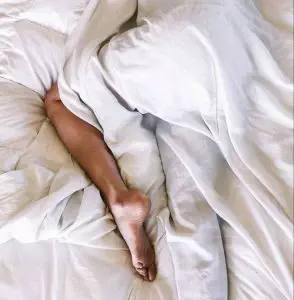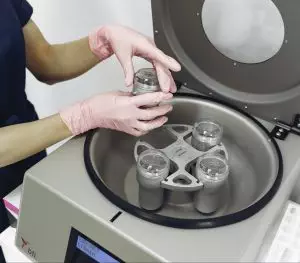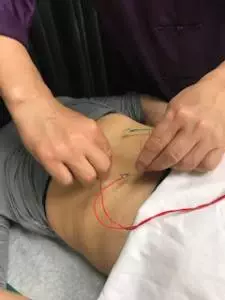-
 Art of Wellness Acupuncture & Traditional Chinese Medicine (TCM)11704 Wilshire Blvd, Suite 295, Los Angeles, CA, 90025
Art of Wellness Acupuncture & Traditional Chinese Medicine (TCM)11704 Wilshire Blvd, Suite 295, Los Angeles, CA, 90025
myartofwellness@gmail.com310-451-5522 Office Hours
MonClosedTue7:30 am --4 pmWed7:30 am --4 pmThu7:30 am -- 4 pmFri7:30 am -- 4 pmSat7:30 am -- 4 pmSunClosedOur office opens from Tuesdays to Saturdays 7:30 am to 4 pm, will be closed on Memorial day, Independent day, Labor day, Thanksgiving day, Christmas and New year.
-
Recent Posts
- How to Treat De Quervain’s Tenosynovitis With Acupuncture and TCM
- Chinese New Year 2026: Year of the Horse
- Acupuncture and TCM Treatment for Perimenopause Symptoms
- How to Treat Insulin Resistance With Acupuncture and TCM
- How to Treat Metabolic Syndrome With Acupuncture and TCM
- How to Treat Syncope With Acupuncture and TCM
- How to Treat Thoracic Outlet Syndrome With Acupuncture and TCM
- How to Treat Dupuytren’s Contracture With Acupuncture and TCM
- How to Treat Nutcracker Syndrome With Acupuncture and TCM
- How to Treat Rosacea With Acupuncture and TCM
- How to Treat Perioral Dermatitis With Acupuncture and TCM
- Lymphatic Drainage With Acupuncture and TCM
- How to Treat Turf Toe With Acupuncture
- How to Treat Nerve Pain With Acupuncture and TCM
- How to Treat Watery Eyes With Acupuncture and TCM
- How to Treat Ovarian Cysts With Acupuncture and TCM
- Sign up to receive news and updates and get my free report:“The Top 10 Reasons to Try Acupuncture”

December 2025 M T W T F S S 1 2 3 4 5 6 7 8 9 10 11 12 13 14 15 16 17 18 19 20 21 22 23 24 25 26 27 28 29 30 31
What We Treat
How to Treat Ataxia With Acupuncture and TCM
By Qineng Tan, L.Ac., Ph.D. & Xiaomei Cai, L.Ac., Ph.D.

Ataxia is a general term that covers many conditions involving muscle weakness or lack of coordination. Ataxia causes can include: infections, neurological disorders, degenerative brain disease or tumors, some autoimmune disorders, stroke, or alcohol addiction. Acupuncture can help with the muscular weakness and balance problems of cerebellar ataxia and sensory ataxia.
Ataxia can affect the limbs, leading to difficulty with balance and walking. It can also affect the muscles involved in speech, chewing and swallowing, and eye movements.
Different types of Ataxia include:
- Cerebellar ataxia – The most common types of ataxia are related to some sort of problem with the cerebellum, the part of the brain in the back of the head, which regulates muscle activity, balance, and equilibrium. Damage or dysfunction of the cerebellum can also cause tremors and difficulty in judging distance (dysmetria).
- Sensory ataxia – Ataxia may also happen due to issues with other parts of the brain and nervous system, such as damage to the somatosensory nerve, the brain stem, posterior lobe, cerebral cortex, the spinal cord, or the peripheral nerve. These kinds of ataxia can affect the gait and walking.
- Vestibular ataxia – Inner ear problems can cause ataxia that affects balance and can cause vertigo, dizziness, nausea.
- Hereditary ataxias – While they are rare, some people are born with hereditary forms of ataxia. These are classified as autosomal dominant or autosomal recessive, and they may begin to show up at any point in life. These types of ataxia are usually degenerative, meaning the symptoms are chronic and get worse over time. Autosomal dominant ataxias used to be called “Marie’s ataxia,“ and autosomal recessive ataxias used to be called “Friedrich’s ataxia.”
Ataxia may be acute or chronic, with symptoms that last for hours, days, weeks, or years, depending on the root cause. An infection, for example, could cause a temporary episode of ataxia. Ataxia can be triggered by an autoimmune flare-up.
Acupuncture and other TCM modalities are uniquely helpful for all kinds of neurological problems, including ataxia symptoms. Acupuncture can help to restore communications between parts of the nervous system and repair damaged nerve cells.
Top 10 Causes of Ataxia:
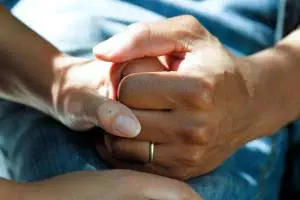
Ataxia can be caused by a wide variety of health issues that affect the brain and nervous system:
- Stroke, brain aneurysm
- Brain tumor or lesions on the spinal cord
- Alcohol abuse
- Some medications or chemotherapy
- Toxins, heavy metal poisoning
- Severe vitamin deficiency
- Hypothyroidism, hyperthyroidism, thyroid problems
- Multiple Sclerosis
- Celiac Disease
- Encephalomyelitis (Chronic fatigue syndrome, ME/CFS)
Ataxia can also result from serious infections like Lyme disease, Chickenpox, HIV, or COVID-19.
The severity and duration of ataxia symptoms can vary, depending on the cause of ataxia, and the type.
Medical Diagnosis and Treatment for Ataxia
It can be challenging to get a clear diagnosis when a person shows symptoms of Ataxia. Testing for Ataxia often involves performing the Romberg Test. This is a fairly simple, physical test, often used by both doctors to measure a person’s balance and coordination. It is sometimes used by police officers to determine if someone is under the influence of alcohol.
The patient undergoing examination stands in various positions, closing and opening the eyes, and shaking the head from side to side. The changes in their ability to balance and maintain their position can help a doctor quantify their equilibrium in order to diagnose sensory ataxia, or vestibular ataxia, for instance. It can also help determine if a patient suffers from vertigo.
Other physical testing involves studying a person’s gait, or mode of walking. A person with sensory ataxia, for example, often demonstrates a particularly heavy, high-stepping gait due to the lack of sensation of the bottoms of their feet when they touch the ground.
Blood tests, spinal tap testing, or MRI imaging may show if ataxia is due to some sort of damage to the brain or spinal cord, or if there are lesions, tumors, or possibly some sort of infection causing the problem.
For most ataxia symptoms, however, there is no specific medical treatment. Patients who are having trouble with walking or moving their hands and facial muscles, may be referred to physical therapy or occupational therapy. Some people will need walkers or other physical aids.
Acupuncture offers a way to help people with all kinds of ataxia to improve their muscle coordination, balance, and other problems.
Can Acupuncture Help Ataxia?

Acupuncture treatment and other TCM modalities are suited to helping patients with all kinds of neurological conditions, by enhancing connections between the brain and the nervous system, and helping to restore the healthy development of nerve and neural cells. For patients with ataxia, this means an improvement in muscle coordination and limb function. Similar to the way that acupuncture helps Bell’s Palsy,Trigeminal Neuralgia, Myasthenia Gravis, and Parkinson’s, it may be able to improve eye problems and problems with eating due to nerve damage.
One case study followed a man who had suffered a stroke and was experiencing sensory ataxia. After regular rehab, he regained some of his muscular strength, but still had trouble with balance and perception. Acupuncture helped him regain his sense of spatial awareness and coordination of his lower limbs.
Another study found that acupuncture treatment helped increase connectivity between different parts of the brain and motor function in patients who were recovering from a stroke.
Formulations of traditional Chinese herbs are also a key part of TCM treatment for ataxia.
Tai Chi movement practice can also benefit people with ataxia, promoting better dynamic balance.
Acupuncture Near Me for Ataxia in West Los Angeles
Conditions like ataxia can be difficult to treat with conventional medicine. Neurological disorders, autoimmune disorders, stroke recovery, the long-term effects of a serious infection; these are all situations in which a person may be helped by trying acupuncture and TCM as an alternative or adjunct to traditional treatment. Drs. Tan and Cai at Art of Wellness in Los Angeles, CA have over 30 years of experience helping people regain muscular strength and motor function.
*This article is for education from the perspective of Traditional Chinese Medicine only. The education provided by this article is not approved by FDA to diagnose, prevent, treat and cure human diseases. It should not stop you from consulting with your physician for your medical conditions. Traditional Chinese Medicine is based on Qi, which is an invisible force that usually cannot be observed by modern science. Because science focuses on testing ideas about the natural world with evidence obtained through observation, these aspects of acupuncture can’t be studied by science. Therefore acupuncture and Chinese herbs are often not supported by double-blind, randomized trials, and they are considered alternative medicine therapies in the United States.
How to Treat Myasthenia Gravis With Acupuncture and TCM
By Qineng Tan, L.Ac., Ph.D. & Xiaomei Cai, L.Ac., Ph.D.

Muscle weakness around the eyes, drooping eyelids (ptosis), double vision, blurred vision (diplopia), impaired speech? These are potential signs of Myasthenia Gravis, an autoimmune disorder that affects the voluntary neuromuscular system, especially around the eyes, mouth, and throat, and the limbs. Acupuncture and TCM offer an adjunct treatment for Myasthenia Gravis symptoms.
As with some other autoimmune diseases, Myasthenia Gravis causes antibodies produced by the body’s own immune system to attack healthy cells instead of pathogens. In the case of Myasthenia Gravis, the immune cells attack receptors on certain groups of muscles, which blocks chemicals required to stimulate voluntary muscular contractions.
A person can develop Myasthenia Gravis at any age, but the disorder is twice as prevalent among women between 20 and 40. Myasthenia is a chronic condition that cannot be completely cured. However, the symptoms can often be controlled with medications and/or other types of treatment for myasthenia gravis.
Many people with Myasthenia Gravis are able to improve their muscular strength with the right combination of treatments and maintain their normal activities. Acupuncture and other TCM modalities can be used as an adjunct therapy to improve quality of life and keep functionality strong, helping to control this autoimmune disorder.
What Causes Myasthenia Gravis?
Our voluntary muscular movements rely on the ability of our muscles to receive communications through the nervous system. There are various neurotransmitters that interact with receptors on the muscles and the proteins that make up the chemical connections between nerves and muscles. Some people with Myasthenia Gravis seem to have antibodies that are damaging or destroying these key receptors and/or proteins. Other people with Myasthenia Gravis, however, do not show unusual antibody activity (seronegative myasthenia gravis or antibody-negative myasthenia gravis), but doctors believe they must still be experiencing some form of autoimmune dysfunction affecting the nerves and muscles.
The thymus gland plays a part in immune function and is believed to play a role in the production of these antibodies that block receptors. Some people with Myasthenia Gravis had an enlarged thymus gland, or a tumor or tumors on the thymus gland.
In rare cases, a baby may be born with a form of congenital Myasthenia gravis; this is called congenital myasthenic syndrome.
People with Myasthenia Gravis may also have problems with their thyroid gland, and may be more likely to show signs of other autoimmune disorders, like rheumatoid arthritis, or lupus.
Symptoms of Myasthenia Gravis

More than half of people who end up discovering that they have Myasthenia Gravis first present with eye problems, such as double vision, blurry vision, or droopy eyelids. But the signs can also show up in the throat, with trouble swallowing, or in the mouth area, with trouble forming words, chewing food, or even breathing.
Signs of myasthenia gravis include:
- Weakness of the muscles around the eyes (ocular myasthenia)
- Drooping eyelids (ptosis)
- Double vision or blurred vision (diplopia)
- Speech problems, impaired speech (dysarthria), trouble pronouncing words
- Shortness of breath
- Change in facial expressions
- Muscular weakness in the neck, arms, hands, or legs
- Difficulty holding up the head, neck problems
- Fatigue, especially muscle fatigue
Symptoms of Myasthenia Gravis often seem to abate in the early part of the day, after a night’s rest, and then worse as the day goes on, and a person has been more active. In other words, the muscle weakness tends to improve with rest, and get worse with exertion.
Like some other autoimmune disorders, Myasthenia Gravis symptoms can come and go, sometimes flaring up and at other times going into remission. Some issues that can exacerbate symptoms might be:
- Infection or illness
- stress
- Fatigue, overwork, not enough sleep
- Surgery
- Menstrual period
- Pregnancy
- Certain medications, including some antibiotics, anesthetics, or beta blockers
The most serious form of Myasthenia Gravis occurs if the muscles that control the breathing apparatus become so weak and fatigued that a person cannot breathe; this is a medical emergency called a “myasthenia crisis,” and requires immediate medical intervention.
Myasthenia Gravis Treatment
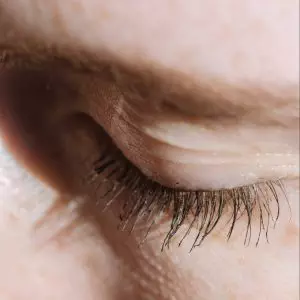
It can be a difficult process being definitely diagnosed with Myasthenia Gravis. Problems with balance, coordination, reflexes, and muscle strength may show up in a neurological exam, but they do not prove definitively what is going on. When the eyelids are drooping, doctors will often perform a test where they ice the area for two minutes to see if this improves the problem. A blood test may show a higher than normal level of antibodies of the type that affect the muscle receptors or proteins. A CT or MRI may reveal a tumor on the thymus.
Other conditions that may appear similar to Myasthenia Gravis include ALS and botulism.
Doctors will prescribe different medications to treat Myasthenia Gravis, either alone, or in combination, depending on the severity and type of symptoms. Corticosteroids and immunosuppressants can reduce the production of antibodies. Plasmapheresis can remove some of the overload of antibodies already in the system. Intravenous immunoglobulin introduces healthy antibodies that can cancel out the malfunctioning ones. Cholinesterase inhibitors can help boost the communication between the nervous system and the muscles. Unfortunately, all of these medications can come with side effects.
Surgical removal of the thymus gland if there is a tumor, or even in some cases when there is no tumor but the gland is believed to be a contributing factor, may help relieve the condition.
Acupuncture and TCM, when used as an adjunct, can help alleviate symptoms of the disorder itself, and help mitigate the side effects of other treatments.
Can TCM Herbs and Acupuncture Help Myasthenia Gravis?
Myasthenia Gravis causes miscommunications between the nervous system and the muscles. Acupuncture treatment can be beneficial for many different types of neurological, musculoskeletal, and autoimmune disorders because it has a positive impact on the communications between the various systems of the body.
TCM treatment with an experienced acupuncturist can be very helpful for patients with Myasthenia Gravis, as we take all aspects of your health into consideration while also focusing on the symptoms related specifically to this autoimmune condition. For example, acupuncture can help with sleep, feelings of anxiety and depression, problems with appetite and digestion, as well as with the muscular weakness associated with Myasthenia Gravis.
One study tested the effects of acupuncture treatment on ocular myasthenia, or eye-related symptoms. Over 90% of the patients treated experience significant improvement in their symptoms.
Chinese herb preparations used in addition to Western conventional medicines can help patients with Myasthenia Gravis. A study compared two groups of patients: one treated with corticosteroids (Prednisone), and one treated with both Prednisone and Chinese herbs. After three months, the patients given herbs showed more improvement, and were able to reduce the amount of corticosteroids needed.
A review of several studies done in China of acupuncture treatment used as complementary treatment for Myasthenia Gravis concluded that patients who had acupuncture reported better clinical outcomes than people who only received the standard pharmaceutical treatments.
While it may be challenging, it is good to include physical activity and even muscular strength training, as it is possible for patients to help overcome muscle weakness with regular exercise. Your TCM practitioner can help you follow an appropriate nutrition and movement program.
Acupuncture Near Me for Myasthenia Gravis in West Los Angeles
TCM is well-suited to help patients who suffer from both autoimmune disorders and neurological and muscular problems of all kinds because it works on multiple levels to help quiet pain signals while boosting communication signals between the different systems of the body. Dr. Tan and Dr. Cai have over 30 years of experience helping people recover from chronic illnesses like Myasthenia Gravis.
*This article is for education from the perspective of Traditional Chinese Medicine only. The education provided by this article is not approved by FDA to diagnose, prevent, treat and cure human diseases. It should not stop you from consulting with your physician for your medical conditions. Traditional Chinese Medicine is based on Qi, which is an invisible force that usually cannot be observed by modern science. Because science focuses on testing ideas about the natural world with evidence obtained through observation, these aspects of acupuncture can’t be studied by science. Therefore acupuncture and Chinese herbs are often not supported by double-blind, randomized trials, and they are considered alternative medicine therapies in the United States.
How to Treat Huntington’s Disease With Acupuncture and TCM
By Qineng Tan, L.Ac., Ph.D. and Xiaomei Cai, L.Ac., Ph.D.
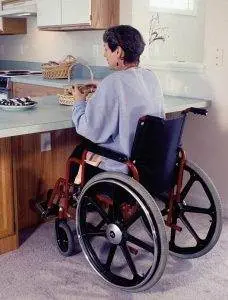
Huntington’s disease is a rare genetic disorder that causes progressive neurodegenerative disease. A neurological disorder, Huntington’s causes damage to brain cells, which leads to physical symptoms like tremor, cognitive problems, and mental disorders, including feelings of depression.
Signs of Huntington’s disease (HD) can begin to show up at any time after age two, and in some cases, a child may develop juvenile Huntington’s disease. Most often, though, a person does not begin to have symptoms of Huntington’s disease until adulthood, usually when they are in their 30s or 40s. Huntington’s is a progressive disease in which symptoms become increasingly severe over time.
Medical science does not currently have a cure for Huntington’s, nor a treatment that will halt the progression of Huntington’s disease. Patients may receive treatment in the form of medications and physical therapy to help control physical symptoms like shaking hands and involuntary movements. They may also be prescribed psychiatric medications to try to help with depression and anxiety.
Acupuncture and TCM can be an effective adjunct and alternative treatment for Huntington’s disease, helping to protect and stimulate the nervous system. TCM can also help address mental health and emotional disorders, like depression, anxiety, and mood swings.
Huntington’s Disease Symptoms
People with Huntington’s disease may start off having a variety of mild symptoms. Over time, the symptoms may change, with some coming or going, and some getting worse. Signs of Huntington’s disease can be related to involuntary movements of the body, cognitive decline that affects a person’s thinking processes, and psychiatric disorders that cause emotional upset. Some of the most common symptoms of Huntington’s disease include:
- Uncontrollable movements: involuntary jerking of the limbs, or writhing, also known as chorea
- Stiff limbs, muscle stiffness, neck stiffness
- Tremor, shaky hands, difficulty holding things
- Slow or unusual eye movements
- Problems with balance or walking
- Difficulty swallowing
- Speech problems, slurred speech
- Having a hard time focusing on a a task
- Having a hard time finding the right words or processing information
- Getting completely caught up with a task or thought pattern
- Impulsive behavior or emotional outbursts
- Lack of awareness of how one is behaving or one’s own changing abilities
- Feelings of apathy, sadness, depression, suicidal ideation
- Manic behaviors or OCD (obsessive-compulsive disorder)
- Trouble sleeping, insomnia
- Extreme fatigue
- Weight loss
Symptoms of Huntington’s disease worsen gradually over time, until ultimately, a person will need assistance to move and eat.
What Are the 5 Stages of Huntington’s Disease?
Huntington’s is a progressive disorder of the brain that causes symptoms to increase in severity over the course of several years. The progression from experiencing mild symptoms to needing assistance due to disability could take 10 years, or a person might live another 30 years.
Sometimes you will hear doctors refer to 3 stages of Huntington’s Disease, or the following 5 stages:
- Preclinical Stage – during this time, a person with Huntington’s may begin to notice mood swings, irritability, and other emotional and cognitive issues beginning to develop, but they have not yet been diagnosed with Huntington’s.
- Early Stage – as physical symptoms like tremors and trouble with eating and sleeping begin to become more and more noticeable, a person will seek medical help and be diagnosed. At this point, they can still carry on with most normal activities without help.
- Middle Stage – during the middle stages of Huntington’s a person will begin to need assistance with things like driving and domestic tasks, as they may not be able to coordinate movements reliably or think through problems or take in new information.
- Late Stage – as Hungtington’s disease progresses further, a person may have memory loss, dementia, and changes in personality. They will likely be bedridden and need help with eating, possibly requiring a feeding tube because of trouble swallowing.
- End of Life Stage – there comes a point when a person with Huntington’s will need end of life care, either in a hospital or at home, when they will need to be as comfortable as possible. The most common cause of death with Huntington’s is pneumonia, which can happen when a person aspirates food particles into the lungs.
How is Huntington’s Disease Inherited?
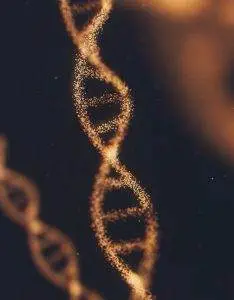
Huntington’s disease is a type of autosomal dominant disorder, which means that a person only needs to inherit one dominant gene from one parent in order to inherit this disorder. If a person has HD, there is a 50% chance that they will pass it on to a child. If a child of a person with HD does not inherit the gene, and therefore does not have HD, then that means they will not pass it on to their children. It is rare, but possible, for a person to be born with a new mutation in the specific gene, and so does not actually inherit HD from a parent.
Because HD typically does not begin to show up until close to middle age, some people who know that they may have the genetic mutation will have genetic testing for Huntington’s disease. This test will tell most people whether or not they will begin to develop Huntington’s symptoms as they age. However, there is a “gray area,” in which a person may have some of the mutated sequencing in their genetic makeup, but not enough to necessarily lead to the development of the disease. These people can still pass on the mutation to their children, and they may have a less severe form of Huntington’s, and/or not develop symptoms until later in life.
Can Acupuncture Help Huntington’s Disease?
Scientific research has been demonstrating more and more that acupuncture can help with many conditions by maintaining the health and connectivity of brain cells and nerve cells. Cells are constantly going through processes of generation and degeneration. The stimulation of certain acupoints has been shown to have a positive effect on these processes, which can be beneficial for people with neurological disorders like HD and Parkinson’s.
Even though we know that Huntington’s and Parkinson’s are specifically related to protein production, we also know that disease is not merely about one small, isolated thing happening in the body. We must take the whole person into account. Stress and many other factors also play a role in how a disease affects each individual. Acupuncture can be a helpful modality that reduces stress in the body and facilitates regeneration and protection of cells.
With TCM, we are able to address the physical, mental, and emotional aspects of Huntington’s disease all at the same time.
Chinese herbs have traditionally been used to help symptoms such as tremors, stiff limbs, muscle weakness, and slow movements. While from the medical point of view these problems are related to the nervous system, in TCM theory we also see them as being related to deficiencies in the kidney Qi, and excess wind. Therefore, herbs that help strengthen the Kidneys and dispel wind may be used in different combinations to treat conditions like Huntington’s disease.
Acupuncture treatment has been shown to help reduce tremors and shaky hands. One study showed that Chinese herbal preparations were effective at helping to reduce involuntary movements. Another study showed that herbs helped with the normal production of proteins and brain cell function.
Neurological Treatment With Acupuncture

Acupuncture and TCM can help with many different kinds of neurodegenerative disorders, whether they are caused by genetics, autoimmune disease, or some other neurological problem.
Neurodegenerative diseases cause the degeneration and death of neurons, or brain cells that communicate with the nervous system. In that sense, Huntington’s disease bears some similarities to other neurodegenerative diseases like:
- Parkinson’s disease
- Alzheimer’s disease
- ALS (Lou Gehrig’s disease)
- Spinal muscular atrophy
- Essential Tremor
- Multiple Sclerosis (MS)
- Bell’s Palsy
- Guillain-Barre syndrome
Many of these conditions can be helped with acupuncture, which is known to help improve the health of the brain, nerves, spinal cord, and the electrical impulses that create connectivity and functionality in the movements of the musculoskeletal system. TCM modalities can also help to relieve stress, improve sleep, boost cognitive function, and regulate mood swings.
Acupuncture Near Me for Huntington’s Disease, Los Angeles Area
Huntington’s disease is a progressive illness, and it becomes harder and harder for a person with HD to communicate what they are feeling. People with Huntington’s may experience both physical and emotional pain. Patients with Huntington’s need a caring team of healthcare providers who can help treat the disease, but also help their emotional and mental health.
At Art of Wellness, we have over 30 years of experience helping people with neurodegenerative disorders feel more comfortable and live the fullest life possible.
*This article is for education from the perspective of Traditional Chinese Medicine only. The education provided by this article is not approved by FDA to diagnose, prevent, treat and cure human diseases. It should not stop you from consulting with your physician for your medical conditions. Traditional Chinese Medicine is based on Qi, which is an invisible force that usually cannot be observed by modern science. Because science focuses on testing ideas about the natural world with evidence obtained through observation, these aspects of acupuncture can’t be studied by science. Therefore acupuncture and Chinese herbs are often not supported by double-blind, randomized trials, and they are considered alternative medicine therapies in the United States.
How to Treat Meningitis With Acupuncture and TCM
By Qineng Tan, L.Ac., Ph.D. & Xiaomei Cai, L.Ac., Ph.D.
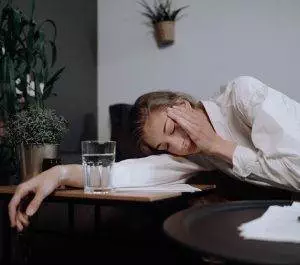
Fever, vomiting, stiff neck, skin rash, aversion to light, bad headache? These are possible early signs of meningitis. Bacterial meningitis can become very serious very quickly—and even be deadly—,so it is important to be aware of meningitis symptoms. Acupuncture and TCM can provide adjunct treatment for meningitis in addition to conventional medicine.
Meningitis is a general term for any kind of swelling or inflammation in the tissue that surrounds the brain and spinal cord. These membranes are called the meninges. Sometimes called “spinal meningitis,” this type of inflammation is most often caused by either a bacterial infection or viral infection, but other things can cause meningitis, too.
The bacteria and viruses that can cause meningitis can be spread from person to person in the same ways as most colds, flus, and other infections. If you suspect you may have bacterial meningitis, it is important to seek treatment right away. Similar to encephalitis (inflammation of the brain), this illness can progress quickly, sometimes causing seizures and even death.
Even after meningitis moves past an acute phase, many people will suffer from after effects and complications of meningitis, like headaches, vision or hearing problems, or cognitive issues. TCM and acupuncture can help people recover more fully from the effects of brain swelling due to meningitis.
Top 5 Types of Meningitis:
Swelling in brain can be caused by meningitis bacteria, or can manifest due to a virus or some other condition. Causes of meningitis can include:
- Bacterial meningitis – meningitis can be triggered by various bacteria, such as the kinds that cause strep throat, pneumonia, tuberculosis, and colds and flu. This type of meningitis can become serious, even causing death if left untreated. Symptoms usually appear quite suddenly, and can worsen in a matter of hours.
- Viral meningitis – Viruses that can cause meningitis include non-polio enteroviruses, herpes virus, West Nile, Epstein-Barr, measles, mumps, and chickenpox/shingles viruses. Typically meningitis caused by these types of viral infection is milder than bacterial meningitis. Certain types of meningitis are also associated with HIV/AIDS.
- Certain types of cancer – if a cancer tumor, such as a brain tumor, or a breast cancer tumor, begin to break apart and move through the body, they can get into the meninges and cause carcinomatous meningitis.
- Lupus – sometimes meningitis can be part of an autoimmune response that affects the central nervous system, such as occurs with Lupus.
- Injury to the head or spine, brain surgery – swelling around the brain can be caused by some kind of external physical trauma
Meningitis can also be caused by a fungus or parasite that gets into the body.
The effects of meningitis, especially bacterial meningitis, can be very serious, so if you see a combination of symptoms from those listed below, you should seek urgent medical attention.
Top 10 Meningitis Symptoms:
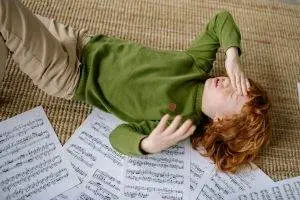
Brain swelling symptoms or symptoms for meningitis can include:
- Fever
- Nausea and/or vomiting
- Stiff neck, neck stiffness
- Severe headache
- Meningitis rash on any part of the body: small red spots, red blotches, blood blisters
- Aversion to bright light
- Fatigue, sleepy, hard to stay awake
- Confusion, delirious, foggy head, difficulty concentrating
- Seizures
- No appetite or thirst
In infants and young children, signs of meningitis might include: crying, not wanting to eat, hard to wake up, high fever, stiffness in the body, swelling or bulging on the top of the head (fontanel).
There are a few types of meningitis vaccine, or meningococcal vaccine, which can help to prevent bacterial meningitis.
Diagnosis and Treatment for Meningitis
When a patient presents with these types of symptoms, a doctor will probably want to err on the side of caution and test for bacterial meningitis, since time is of the essence when treating what could be a very serious condition.

Blood tests, CT scan, or MRI may all be used to check for signs, but a spinal tap to collect cerebrospinal fluid is considered the definitive way to confirm a diagnosis of bacterial meningitis.
Bacterial meningitis is treated with antibiotics and corticosteroid medications to get rid of the bacterial infection and reduce swelling.
Viral meningitis will not respond to antibiotics. Some doctors may prescribe steroid medications to reduce swelling.
It can take longer to figure out what is causing swelling in the brain if it is caused by some other factor, such as a fungal infection, or in relation to an autoimmune disorder. In some cases, a doctor may choose to start treating with antibiotics and/or antivirals until the root cause is determined.
Even after meningitis treatment, some people will continue to have after effects, some of which can even lead to disability. Cognitive problems with memory and concentration, vision problems, headaches, tinnitus (ringing in the ears), dizziness, problems with balance and coordination, and even seizures, can be some of the long-term effects of meningitis. Acupuncture and TCM can be very helpful for treating these lingering symptoms of meningitis.
Can Acupuncture Help Meningitis?
In Traditional Chinese medicine, we classify many infectious diseases—including cold and flu, strep throat, chicken pox, SARS, tuberculosis, and meningitis—as “warm” diseases. When these types of external pathogens get into the body, they cause fever, which depletes the Yin (cool, liquid) energy of the body. The TCM approach, then, is primarily to clear the heat.
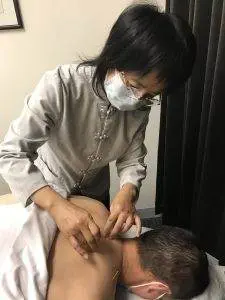
TCM has its own way of looking at symptoms occurring in a pattern, from which we deduce what kind of pathogenic forces are creating disharmony. The TCM view of meningitis is that it relates to an invasion of Heat that leads to a deficiency of Yin energy. A pattern of symptoms that includes: fever, red skin rash, irritability, confusion, and trouble sleeping would indicate that pathogenic heat is depleting the body of fluids and affecting the pericardium, which in TCM means “protector of the heart.”
When these symptoms are present, we know that there is inflammation causing swelling of tissues and preventing the smooth flow of nutrition and Qi to the vital organs. Chinese herbs and acupuncture can help reduce inflammation that causes symptoms of meningitis.
Chinese herbal formulations that go back centuries can also have antibacterial and antiviral effects.
Acupuncture treatment can not only help, then, the root cause of meningitis, but can also deal with the symptoms many people experience as a result of swelling in the brain, such as headaches, dizziness, and spasms.
Acupuncture Near Me for Meningitis – Los Angeles Area
Meningitis is a condition that needs urgent care because it can be a very serious illness in the short-term. Meningitis can also lead to long-term effects that are debilitating. Acupuncture and TCM can provide relief and recovery from meningitis symptoms.
*This article is for education from the perspective of Traditional Chinese Medicine only. The education provided by this article is not approved by FDA to diagnose, prevent, treat and cure human diseases. It should not stop you from consulting with your physician for your medical conditions. Traditional Chinese Medicine is based on Qi, which is an invisible force that usually cannot be observed by modern science. Because science focuses on testing ideas about the natural world with evidence obtained through observation, these aspects of acupuncture can’t be studied by science. Therefore acupuncture and Chinese herbs are often not supported by double-blind, randomized trials, and they are considered alternative medicine therapies in the United States.

